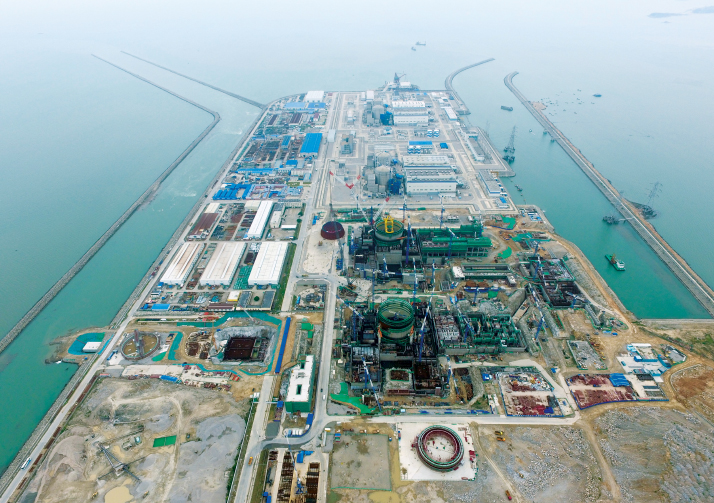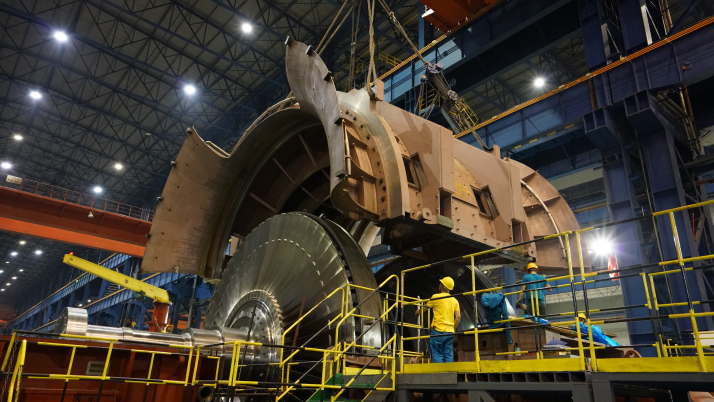|
||||||||||
| Home Nation World Business Opinion Lifestyle ChinAfrica Multimedia Columnists Documents Special Reports |
|
||||||||||
| Home Nation World Business Opinion Lifestyle ChinAfrica Multimedia Columnists Documents Special Reports |
| ChinAfrica |
| Clean Energy |
| Kenya partners with China to set up nuclear power plants for electricity generation |
| By Gitonga Njeru | VOL.11 December ·2019-12-14 |

An aerial view of the installation site of the hemispheric dome of the No. 5 unit of Fuqing Nuclear Power Plant in Fuqing, southeast China's Fujian Province, on May 7, 2017 (XINHUA)
A frustrated Phillip Kariuki, 38, has to suffer through power shortages at his home in east Nairobi almost on a daily basis. The blackouts are the result of an electricity shortage in Kenya's national power grid. The country barely produces about 3,000 mw of electricity each year and it is only available to 50 percent of the population, according to statistics from the Ministry of Energy.
"To make matters worse, my electricity bill averages about $20 per month. That is expensive [in Kenya]," said Kariuki, adding that the inconvenience of going about life under candle light at night with two young children is frustrating. "I hope all these problems will disappear with increased electricity in the national grid," he said.
It's not only at home where the blackouts have a negative impact. Kariuki said businesses are also suffering.
"I owned a business not too long ago, a cybercafé with Internet services. But I had to close my shop as I could not afford the high electricity bills. Operating costs because of high energy bills made it impossible to make a profit," said Kariuki.

A component of Hualong One pressurized water reactor of China, the prototype based on which a nuclear plant will be built by China for Kenya (XINHUA)
Change is coming
But now, a Chinese company contracted by the Kenyan Government to find a suitable location for the construction of a nuclear power plant is giving Kenyans hope. Estimates from the Ministry of Energy show that 1,700 mw of power by nuclear will be added to the national grid, accounting for up to 60 percent of the country's readily available electricity and reducing electricity costs in the long term.
Once the location has been secured, the country's first nuclear power plant is expected to be completed in eight years. The Nuclear Power and Energy Agency (NuPEA), a Kenyan state corporation established under the Energy Act 2019, confirmed that three suitable locations along the coastline have been identified by the China National Nuclear Corp. (CNNC). The company is also tasked with the building and design of the nuclear plant.
"I can confidently tell you that we have located three sites in the country where we hope to build the country's first nuclear power plant," said Collins Juma, Chief Executive Officer of NuPEA, at an energy stakeholders meeting held in Nairobi recently. "We hope it will be operational by 2027. The consultation costs that we have paid CNNC is 50 million shillings ($500,000), but costs are expected to increase as we reach the construction stage at a date to be announced. Constructing a nuclear power plant is expensive but it is worth the effort.
He confirmed that the prospective sites are located on the Indian Ocean, Lake Victoria and Lake Turkana and after the preferred site is selected, the land will be bought. Juma said they have recently trained 29 Kenyan scientists at Russian and Chinese universities in preparation for the nuclear project.
"We are serious about this matter. Feasibility studies have been done on the sites and I can confirm that they are viable. This is part of our government program to be a newly industrialized country by 2030," said Juma.
Continental nuclear option
Currently in Africa, only South Africa has two nuclear power plants that provide 5 percent of its total electricity output, according to World Bank figures. But there are a number of African countries that have received approval from the International Atomic Energy Agency in Vienna, Austria, to construct nuclear power plants.
Nigeria, Ghana, Namibia, Sudan, Tanzania, Uganda, Zambia, Algeria and Egypt are waiting to begin construction of their first nuclear power plants.
The World Bank said that despite many economic challenges, Kenya's economy grew by 6 percent last year to $99 billion, making it the sixth largest economy in Africa and the 65th largest in the world based on the World Bank data. According to World Bank economist Naomi Rono, who attended a development workshop in Kenya recently, the country's economy will expand further this year.
"I know that we [Kenya] face many challenges, such as high energy costs, but the good news is that the costs will drop. In fact, during the last eight months, costs have reduced by more than 40 percent. The costs of fuel, such as diesel, are high because of over taxation of the energy sector and if that can work [further reductions], the economy will grow even more," she said.
Rono said it's time Kenya came up with its own nuclear power plant, which averages about $9 billion per unit - expensive by any standards. The long term returns, however, are enormous, said Rono. Though the costs have been rising rapidly from $2 billion in 2002, economic growth is tangible almost immediately after the plant becomes operational.
A raft of studies have shown that nuclear power plants contribute very small amounts of greenhouse emissions into the atmosphere.
"Uranium, that is used as nuclear enrichment, is not burned like coal, so there are zero emissions," said a World Bank economist.
"The idea [of building a nuclear plant in Kenya] should have been decided about 20 years ago - but the decision to partner with China is a good idea," said Rono, based on other successful Kenya-China projects like the improvement in trade created through the road network built across Kenya.
No taxation for nuclear plants
According to Kenya's current acting Finance Minister Ukur Yatani, there will be no need to tax the general population to fund the nuclear plant project. He said there are other ways of recovering the costs of this project.
"Taxation will not be an option as we will overburden a citizenry that is already feeling the pressure of an increased cost of living. We will find other options and I am quite sure about that. Partnering with China is a good idea. We have many challenges but we can overcome them," said Yatani.
He confirmed that the country is also set to license a number of Chinese companies to help Kenya generate more electricity. Three Chinese biomass (renewable energy) companies have already set up operations in the country and hope to generate a capacity of 1,180 mw of electricity each year starting from 2020.
Currently, most of Kenya's electricity is sourced from hydro and fossil fuels. The country currently ranks 23rd in electricity production in Africa.
Yatani said Kenya still needs to improve its energy production as it is vital for economic growth and development of any country.
"No country can prosper without energy. We will need to formulate an energy policy that will make us stronger as a country," said Yatani.
(Reporting from Mozambique)
(Comments to zanjifang@chinafrica.cn)
|
||||||||||||
| About Us | Contact Us | Advertise with Us | Subscribe |
| Copyright Beijing Review All rights reserved 京ICP备08005356号-5 京公网安备110102005860号 |